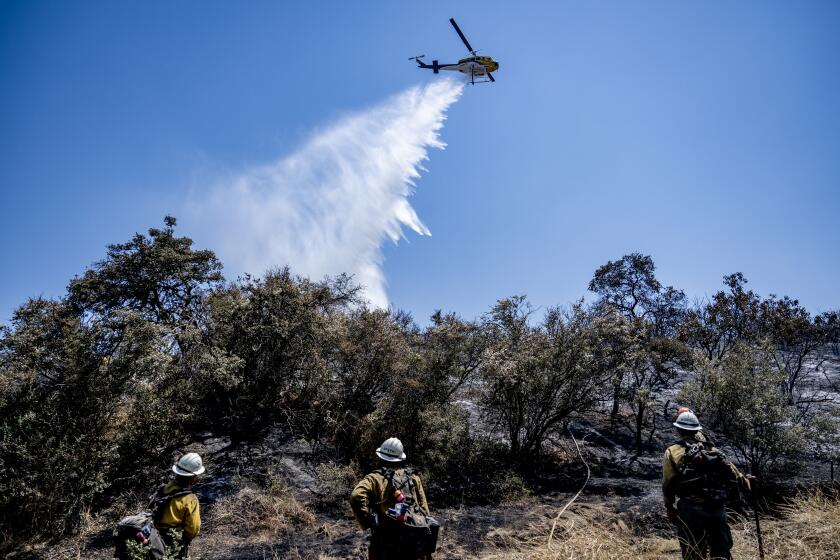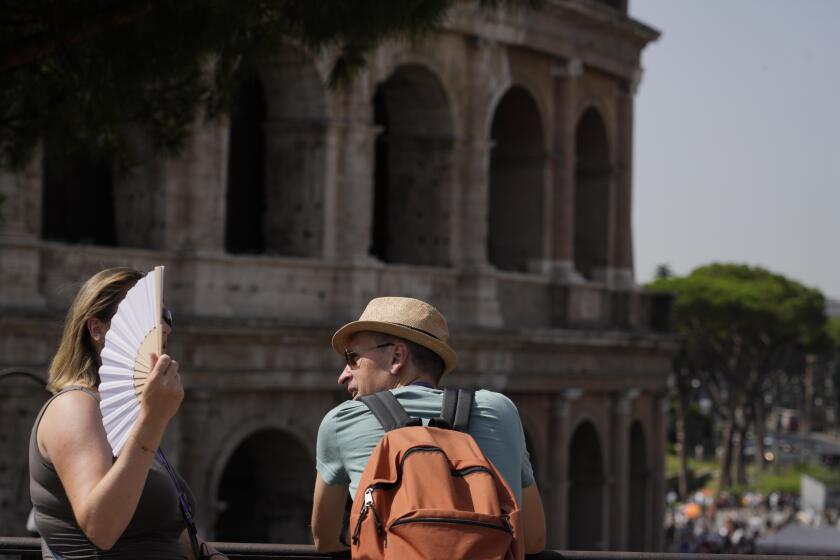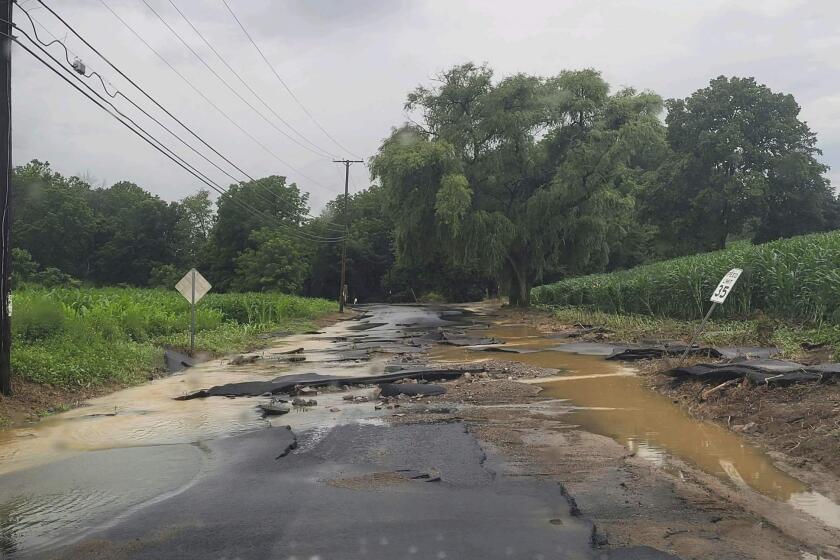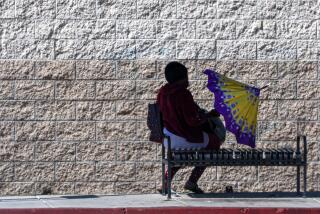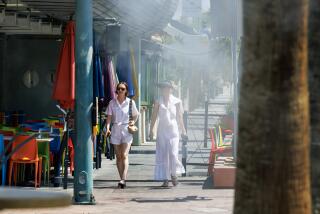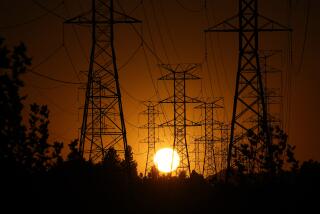Southern California bakes under another day of scorching heat, fires and smog
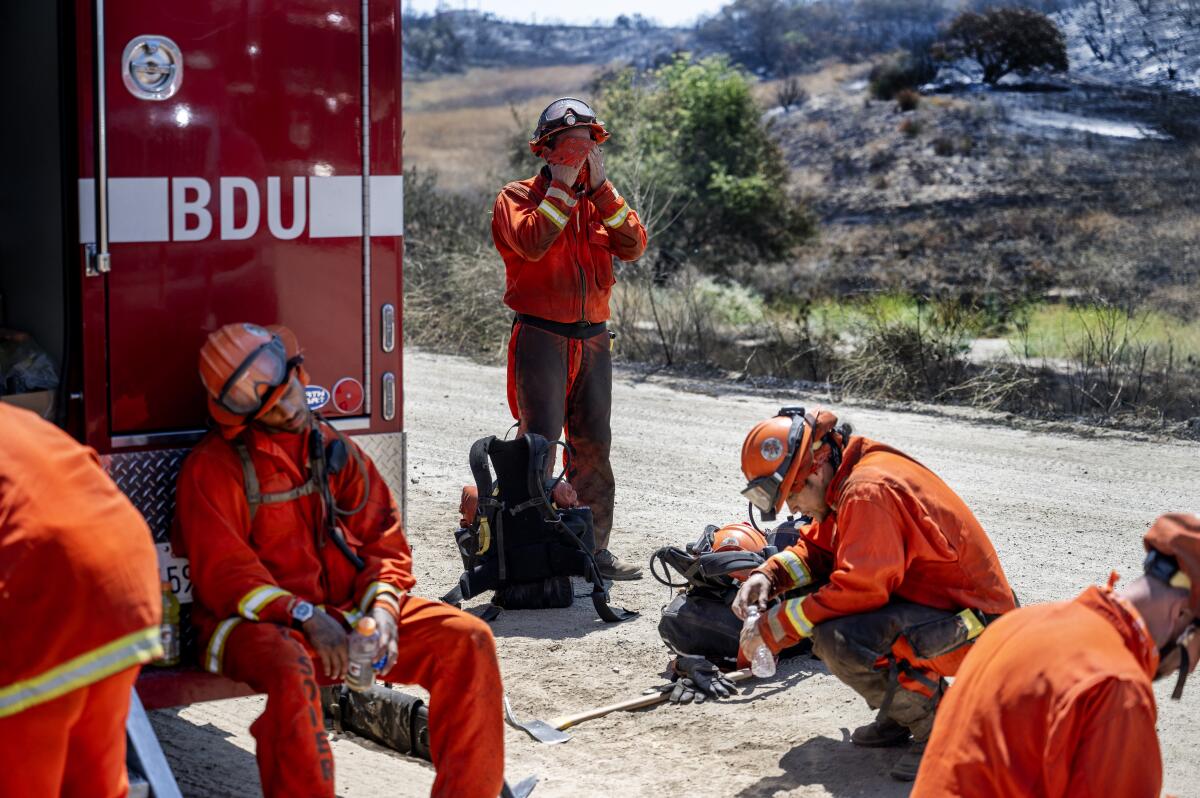
DEATH VALLEY, Calif. — At the Furnace Creek Visitor Center, a digital thermometer read 123 degrees and counting — within striking distance of the hottest temperatures ever recorded on Earth.
By midday Monday, as Southern Californians wilted under another day of a long, scorching heat wave that had brought triple-digit temperatures and increased fire danger, the canyons and gorges of the vast Death Valley National Park near the California-Nevada border shimmered beneath the white-hot sun. Still, the relentless, eyeball-stinging heat wasn’t enough to stop visitors from braving the danger.
“It feels like a blow-dryer in my face,” said Ross Nikides, 31, who had stopped in Death Valley as part of a three-week road trip to see several national parks. “It’s the hottest I’ve ever felt.”
As a heat wave broke records across California and sent residents scrambling for relief, firefighters were making progress in battling several wildfires.
The temperature at the park Sunday soared to 128 degrees, breaking its daily record of 127 degrees set in 2005 and 1972, according to the National Weather Service. It was expected to reach at least 125 on Monday.
Death Valley — a long, narrow basin that plunges far below sea level — is tailor-made to bake. Hot air is trapped by surrounding mountains and circulated like a convection oven.
“It’s amazing — I can’t find the words to describe it,” said Olivier Delecluse, 45, who was visiting the park from France with his wife and two kids.
As a heat wave broke records across California and sent residents scrambling for relief, firefighters were making progress in battling several wildfires.
The park’s extreme temperatures draw heat-seekers from around the world who come to “know how it feels, say they survived,” said public information officer Giovanna Ponce. Dozens of people came to take pictures alongside the thermometer at the visitors’ center Sunday and Monday.
Ponce noted that when air temperatures climb to 120 or higher, surface temperatures can sizzle even more, with the asphalt capable of climbing above 200 degrees.
Italian health authorities are intensifying heat warnings as Southern Europe enters a brutally hot week.
And the hots will keep getting hotter as the burning of fossil fuels continues to heat the planet. Seven of Death Valley’s hottest summers on record have occurred in the last 10 years, Ponce said.
Meanwhile, in Palmdale, the library’s biggest draw Monday was something its patrons couldn’t check out and take home, as much as they may have wanted to: its cool air conditioning.
With temperatures in the Antelope Valley in the triple digits after a weekend of record-breaking heat, Danny Dollines, 69, said staying at home was just not comfortable.
The Palmdale City Library, serving as a cooling center, provided a bit of respite for Dollines, who was happy to sit in the air conditioning. A couple of times a week he also tries to beat the heat by swimming at the pool at the local park, he said.
“It keeps you cool for an afternoon,” he said.
Another library visitor, Jimmy Araiza, 32, said he’d become acclimated to the dry heat while growing up in the Antelope Valley.
“There’s not much you can do about it,” he said.
Italian health authorities are intensifying heat warnings as Southern Europe enters a brutally hot week.
Toyin Lawal, an Antelope Valley resident for 20 years, said she still hadn’t gotten used to it.
“But it’s nature, what can you do?” she said.
Lawal said she was concerned about what the heat could lead to: fires, heatstroke and emergencies.
The heat has made it a busy time to sell ice cream, said Diana Meneses, a manager at Manantial Frozen Treats in Palmdale, with more people coming in around 2 to 3 p.m. and also at night, when temperatures have cooled off a bit. But even the ice cream machines can feel the heat, she said, sometimes shutting off or taking too long to turn on when the store gets too hot.
Heavy rains pound an already saturated Northeast for the second time in a week, spurring more flash flooding, canceled flights and power outages.
On Sunday, daily temperature records were broken in the Antelope Valley. Lancaster Airport reached 110 degrees, surpassing the record of 109 set in 1960. Sandberg saw a high of 99 degrees, breaking the 1998 record of 98.
Interior areas of Southern California reached well into the triple digits Monday, with overnight lows expected in the 70s and 80s for the lower mountains, according to the National Weather Service.
On Monday, Lancaster and Palmdale reached 103 degrees while the high temperature in Chatsworth, Northridge and Woodland Hills was 101, according to the weather service. Burbank had a high of 95.
The Ventura County and San Fernando valleys remained a bit cooler Monday, reaching the low 90s and high 80s, respectively.
The weather service advised residents to check on children, elderly people and pets and to reduce their exposure to the heat. People should be careful with possible fire ignition sources, also, including fireworks and lawn-care equipment. Any wildfires should be reported to authorities.
An excessive heat warning was in effect until 11 p.m. Monday for the Cuyama, s outhern Salinas and San Luis Obispo County interior valleys. Temperatures were expected to reach up to 100 degrees during the day, with overnight lows projected in the 70s to lower 80s.
The high-pressure “heat dome” is expected to retreat to the east on Tuesday, cooling most areas 2 to 5 degrees. Maximum temperatures are expected to range in the lower to mid-70s near the coast, while mountainous regions could see high 80s to 90s, and the Antelope Valley could reach triple-digit highs.
It could warm up again slightly Thursday and Friday through the weekend for lower-elevation mountains and interior regions, but temperatures will most likely fall short of dangerous heat levels.
The South Coast Air Quality Management District issued a heat-related ozone advisory for much of the inland Southern California region until 8 p.m. Tuesday.
Several wildfires have broken out across California during the ongoing heat wave.
The Rabbit fire, which ignited Friday in Lakeview south of Moreno Valley , had burned 8,283 acres and was 45% contained as of Monday evening, according to authorities. Fire crews had worked overnight and into Monday morning to build containment lines but were still battling extreme heat, low humidity and steep terrain. The blaze was expected to be fully contained by Friday.
One woman was severely burned and taken to a burn center by helicopter, said California Department of Forestry and Fire Protection spokesperson Rich Cordova.
Evacuation orders were downgraded to warnings for areas south of Seneca Springs, east of Highway 79, west of Manzanita Park Road and north of Forest Boundary Road.
Heavy rains pound an already saturated Northeast for the second time in a week, spurring more flash flooding, canceled flights and power outages.
Firefighters are also battling other fires near Moreno Valley, including the Reche fire, which scorched 437 acres and had reached 90% containment by Monday evening, according to officials.
The Gavilan fire in Perris, in unincorporated Riverside County, scorched 338 acres and was 60% contained Monday evening, authorities said. The Highland fire, south of Beaumont, had burned 105 acres and was fully contained Monday night.
In Northern California, the Pika fire, which started June 29 near North Dome in Yosemite National Park, continues to burn. The lightning-sparked blaze had burned 818 acres as of Monday evening and was 0% contained.
The wildfires and sizzling temperatures come amid a heat wave that has lingered over much of the Southwest for weeks. Excessive heat warnings were in effect over the weekend for large swaths of Arizona and Nevada, where Las Vegas’ Harry Reid International Airport reached 116 on Sunday, tying the daily record set in 1998. It was just shy of Vegas’ all-time heat record, 117 degrees.
Back in Death Valley, Richard Hancock, 28, had traveled from Birmingham, England, and was en route to Las Vegas with a friend’s bachelor party. The group had sojourned to Badwater Basin, the park’s lowest point and the lowest point in North America, 282 feet below sea level.
“It’s like standing in front of an open oven,” he said of the heat. “I was a bit nervous — is it safe? Is it dangerous? I’m a bit scared of getting a flat tire.”
Sunday’s 128-degree reading was not far from the 134-degree world record set in 1913, park officials said. But some meteorologists have taken fault with that measurement and point instead to a more reliable modern record set in 2021, again in Death Valley, that was even closer to being broken this weekend: 130 degrees.
Smith reported from Death Valley, and Lin and Gupta from Los Angeles County.
More to Read
Sign up for Essential California
The most important California stories and recommendations in your inbox every morning.
You may occasionally receive promotional content from the Los Angeles Times.
